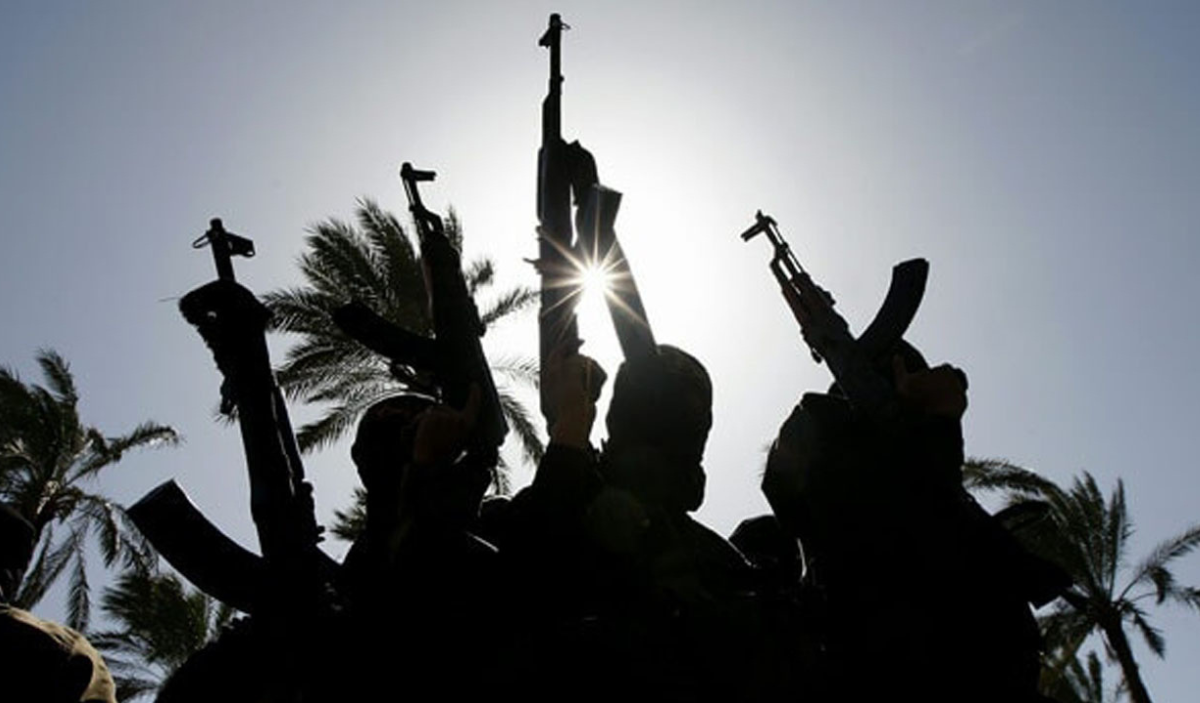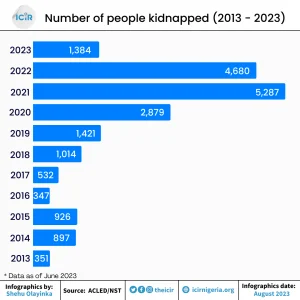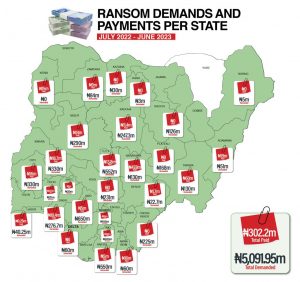
Editorial: Kidnapping, The New Business In Nigeria

“Gunmen abduct two sisters in Abuja, demand N30 million ransom.” “About 3,620 people kidnapped, N5 billion demanded as ransom in one year.” “Kidnappers collected N650 million as ransom in one year.” “Nigerians paid N302 million as ransom in one year,” and “Ekiti schoolchildren abductors demand N100 million.”
These are the headlines Nigerians face every morning. “Kidnapping.” “abduction” and “ransom” have now been embedded in the everyday Nigerian vocabulary. The stories are from the North to the South and the East. As the economy continues to dwindle, families of victims go high and low to source for millions of naira they do not have, to pay ransoms in hopes of securing the release of their loved ones.
Unfortunately, some families don’t get so lucky, and their loved ones do not make it out alive even after paying huge sums in ransom. Sadly, this has become the new oil well for criminals euphemistically nicknamed “unknown gunmen” who carry out their activities and brandish weapons unhindered.
Though kidnapping for ransom dates back many centuries, it has been ten years since the first massive abduction of the Chibok school girls in 2014. Since then, kidnapping has grown into a whole-blown business. The perpetrators have also become so daring that no place is off limits for them, including the Nigerian Defence Academy (NDA), where a military Major was kidnapped in 2021.
Currently, Abuja, the Federal Capital Territory (FCT), is the new epicentre of kidnappings. Nowhere is safe because people are abducted right in the comfort of their homes. As these numbers continue to soar nationwide, the government’s deafening silence continues.
From Family to National Economy: Unraveling the Economic Impact of Kidnappings on Nigerians
The economic impacts of kidnappings in Nigeria on both individual families and the nation’s economy are alarming, contributing to a shadow crisis that is worsening the country’s existing financial challenges.
For many families in Nigeria, kidnappings have led to a nightmare of ransom negotiations that often amount to sums beyond their financial capabilities. It’s more distressing when one factor in that 63 per cent (133 million) of persons living in Nigeria are multidimensionally poor. The kidnappers meanwhile, kidnap both the rich and poor these days, sparing no one. Many families of the abducted victims are plunged into debt and forced to sell assets or leave their jobs, disrupting their lives. The hidden costs, such as ongoing medical care for returned victims and lost productivity, adds to an already complex economic hardship.
Broader Economic Impacts
According to a recent report by the International Centre for Investigative Reporting (ICIR), over 380 persons have been kidnapped in Nigeria in 34 days – between December 1, 2023 and January 3, 2024. These kidnappers typically demanded millions in ransoms, usually much more than the affected families’ net worth.
Nigerians paid as much as $18.34 million in total as ransom to kidnappers between 2011 and 2020, as was contained in a 2020 report by SB Morgen (SBM) Intelligence. When such massive sums – often paid in cash – keep going from families into the hands of kidnappers, it destabilises the nation’s cash flow and further deteriorates the economy.
 Source: ICIR
Source: ICIR
In the FCT alone, from January 2021 to June 30, 2023, 40 kidnap cases were recorded, with about 236 victims involved and N653.7 million lost as ransom. In 2021 and 2022, 13 cases were recorded between October and December, with 80 victims, Nextier reports said.
Again, between July 2022 and June 2023, at least 3,620 people across Nigeria were kidnapped, about N5 billion ($6.5m) was demanded for ransom, and N302.2 million was paid, an SBM Intelligence report said.
According to the reports, Taraba State paid the highest ransom of N60 million, followed by Nasarawa, N47.8 million, Imo N28 million, Adamawa N19 million, Kwara N18.7 million, Oyo N16 million and Kebbi States N15 million, respectively. In states like Kaduna, Akwa-Ibom, Ondo and FCT, victims paid at least N10 million.
 Source: SGM Intelligence
Source: SGM Intelligence
In some cases, the kidnappers demanded ransom in kind. They required foodstuff, motorbikes and other essentials. SBM says cases like this were prevalent in the Northwest and Northcentral.
Catholic priests were soft targets for kidnappers because of their high value. Between July 2022 and June 2023, 21 priests were abducted, mainly in Kaduna, during service and demanded about N50 million.
Recently, two teenage girls were abducted in Abuja, and the abductors demanded N30 million as ransom. The kidnappers initially kidnapped three of the children and sent one of them back home to relate their demands to their father.
On January 2, gunmen abducted Al-Kadriyar and his daughters in Abuja and demanded N60 million as ransom. The family’s inability to meet up with the deadline given by the abductors, Nabeeha, one of the girls, was killed. Though the police claimed to have “successfully rescued the victims”, a member of the family, Sheriff Al-Kadriyar, said the family paid undisclosed amounts before the girls were released to them.
In Ekiti State, six school children and three teachers were kidnapped, and N100 million was demanded by the abductors for ransom. These incidents are only a handful, and many are not reported.
The Nigerian government must direct additional funds towards security and counter-kidnapping measures in response to the crisis. This reallocation implies less investment in critical sectors like education, healthcare, and infrastructure.
Not only does the government spend more on security, but organisations – small and big – also spend more on security and face operational challenges due to insecurity. This situation might lead to these organisations’ human resource budgets suffering as they now have to spend more on security. In the long run, it hampers Nigeria’s economic growth.
Foreign Economic Impact
The insecurity in Nigeria has reached its peak, and this is evident in various facets of our national life. People die daily, businesses are being ruined, investments are nose-diving, multinationals are closing up and vacating the country, and unemployment is soaring. This has become a threat to economic growth and development in the country.
The continuous threat of kidnappings also affects Nigeria’s tourism industry and discourages foreign investors from investing in the country. Foreign investors have been prevented from coming to Nigeria, leading to losses that cut across all sectors, including hotels, restaurants, and other tourism-dependent businesses.
Government Action
The government, by its inaction, has proved to be unable to secure the lives and properties of its citizens solely. Despite burgeoning recurrent expenditure on internal security, citizens spend heavily to protect themselves.
The April 2014 mass abduction by Boko Haram terrorists highlights not only the beginning of widespread kidnaps in Nigeria but also the beginning of the pattern of Federal Government’s lack of response and action to prevent further happenings. Its lackadaisical reaction paved the way for other mass abductions, leading to where we are today.
The Federal Government, acting in its characteristically responsive rather than proactive way in 2022, signed a law mandating at least 15 years in prison for anyone who pays ransom to free a kidnapped victim and a death penalty when the victim dies in captivity. The current surge in kidnappings is a result of the government’s inability to carry out its administrative duty to address insecurity effectively.
With the kidnapping epidemic at an all-time high and government efforts not yielding significant results, it is time for all stakeholders to return to the drawing board to draw up new plans to curb this growing menace before we all end up kidnapped.
About The Author
Related Articles
AES Condemns Niamey Airport Attack, Warns of Coordinated Destabilisation
The Alliance of Sahel States has strongly condemned the armed attack on...
ByWest Africa WeeklyFebruary 2, 2026Mali Cedes Strategic Land to Guinea to Deepen Trade Cooperation
Mali has approved the transfer of a strategic parcel of land to...
ByWest Africa WeeklyFebruary 2, 2026Senegal to Appeal CAF Sanctions After AFCON Final Controversy
Senegal has announced plans to formally appeal the sanctions imposed by the...
ByWest Africa WeeklyFebruary 2, 2026Burkina Faso Takes Legal Step Toward Nuclear Energy Development
Burkina Faso has voted to join the Vienna Convention on Civil Liability...
ByWest Africa WeeklyFebruary 2, 2026











